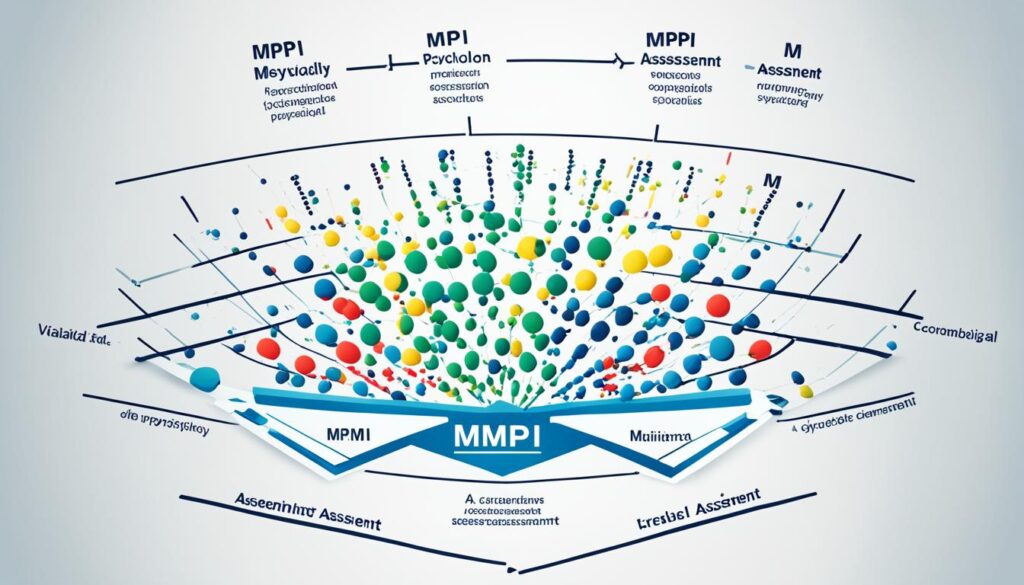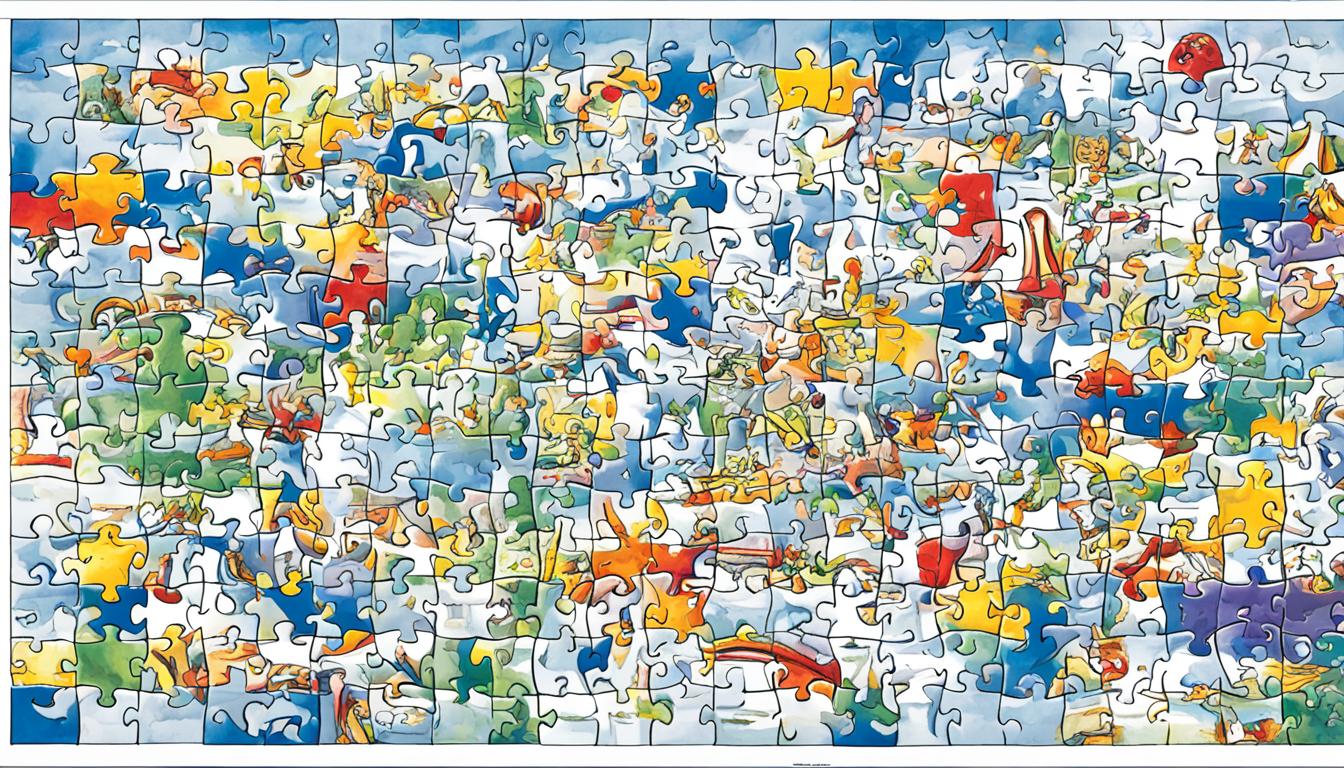Did you know that the Minnesota Multiphasic Personality Inventory (MMPI) is considered one of the most widely used psychological assessment tools worldwide? Referred to as the MMPI-2, this thorough evaluation is used to assess personality characteristics and detect mental health disorders. Its impact on clinical assessment has been substantial, providing valuable insight into the complexities of the human psyche.
Key Takeaways:
- The Minnesota Multiphasic Personality Inventory (MMPI) is a renowned psychological assessment test used for measuring personality traits and diagnosing mental health disorders.
- The MMPI-2 is the most commonly administered version of the test, consisting of 567 true or false items.
- Health professionals use the MMPI-2 to assess and diagnose mental health conditions, making it a valuable tool in the field of psychology.
- The test has undergone revisions over the years to address various concerns, such as cultural bias and representation of diverse populations.
- Interpreting the results of the MMPI-2 requires the expertise of a qualified mental health professional trained in MMPI interpretation.
History and Development of the MMPI
The Minnesota Multiphasic Personality Inventory (MMPI) has a rich history that dates back to the 1930s. Developed by Stuart Hathaway and Charley McKinley at the University of Minnesota, the MMPI was first published in 1942 and quickly became a groundbreaking psychological assessment tool.
During its development, the MMPI relied on a sample of visitors of patients at the University of Minnesota hospital. This extensive research allowed Hathaway and McKinley to create a comprehensive test that measured various aspects of personality and psychopathology.
The MMPI consists of 14 scales, including content scales and clinical scales. These scales provide valuable insights into an individual’s psychology, examining factors such as depression, hysteria, paranoia, and social introversion. By assessing these dimensions, the MMPI can provide valuable information about an individual’s mental health and overall well-being.
| MMPI Scales | Description |
|---|---|
| Scale 1 – Hypochondriasis (Hs) | Measures excessive worries about physical health |
| Scale 2 – Depression (D) | Assesses various symptoms associated with depression |
| Scale 3 – Hysteria (Hy) | Looks for signs of emotionality and exaggerated responses |
| Scale 4 – Psychopathic Deviate (Pd) | Focuses on antisocial and rebellious behavior |
| Scale 5 – Masculinity-Femininity (Mf) | Examines gender-related personality traits |
| Scale 6 – Paranoia (Pa) | Detects signs of suspiciousness and paranoid ideation |
| Scale 7 – Psychasthenia (Pt) | Evaluates obsessive-compulsive symptoms and anxiety |
| Scale 8 – Schizophrenia (Sc) | Identifies signs of confusion, delusions, and unconventional thinking |
| Scale 9 – Mania (Ma) | Measures symptoms of heightened energy and mood instability |
| Scale 0 – Social Introversion (Si) | Assesses an individual’s inclination towards introversion or extroversion |
The MMPI has undergone several revisions over the years to enhance its reliability and validity. The current version, the MMPI-2, is the most widely used iteration of the test. It incorporates updated norms and refined scoring methods, making it even more accurate and useful in clinical practice.
As the University of Minnesota Press continues to support advancements in psychological assessment, the MMPI remains a prominent tool used by researchers, clinicians, and psychologists worldwide.
Administration and Scoring of the MMPI
The Minnesota Multiphasic Personality Inventory (MMPI) is a comprehensive psychological test used by clinicians to assess personality traits and psychopathology.
When administering the MMPI, the clinician provides the test-taker with a booklet containing 567 true or false items. The test-taker carefully reads each statement and responds with either “true” or “false” based on their personal experiences, thoughts, and feelings. The MMPI is a widely used psychological assessment tool that measures various psychological constructs, such as depression, anxiety, and paranoia. By carefully analyzing the test-taker’s responses, the clinician can gain insight into their mental health and personality characteristics. Additionally, the MMPI can be used to uncover men’s hidden intentions in a clinical setting, providing valuable information for treatment planning and intervention strategies.
Once the test-taker completes the MMPI, the clinician hand-scores and analyzes the responses using a scoring key. The scoring process is meticulous and involves plotting the scores on an X-Y graph using 14 scales.
On the X-axis, the MMPI features content scales that measure the validity of the test attempt. These scales determine the extent to which the test-taker’s responses are reliable and consistent. They help identify if the test-taker has answered the questions honestly and accurately.
The Y-axis comprises clinical scales that measure the presence of various psychiatric syndromes. These scales provide valuable insights into the test-taker’s mental health and can indicate the likelihood of specific personality disorders or psychological disturbances.

In addition to the content and clinical scales, the MMPI-2, a widely used version of the test, includes validity scales. These scales assess the accuracy of the test-taker’s responses by detecting inconsistent or overly positive/negative responding. They are crucial in ensuring the reliability and validity of the test results.
The interpretation of MMPI scores requires expertise and training from qualified clinicians who are familiar with the nuances of the test and its scales. A high score on a particular scale does not necessarily indicate a psychological disorder but rather points towards certain personality traits or tendencies that warrant further exploration and analysis.
Criticisms and Revisions of the MMPI
The original MMPI, also known as the Minnesota Multiphasic Personality Inventory, has faced criticism for its cultural bias and lack of representation for social and ethnic minorities. These concerns prompted the development of revised versions, such as the MMPI-2 and MMPI-A, to address these limitations.
The original MMPI was primarily based on research conducted with adult psychiatric patients, leading to potential cultural bias in the test questions and norms. It did not adequately consider the diverse experiences and backgrounds of individuals from different social and ethnic groups.
In recognition of these limitations, the MMPI-2 was developed to improve the test’s applicability to a wider population. The MMPI-2 includes revisions, such as updated norms and added content scales, to enhance the test’s accuracy and cultural relevance.
Additionally, the development of the MMPI-A, or Minnesota Multiphasic Personality Inventory-Adolescent, addressed the need for an adapted version of the test specifically designed for adolescents. This revision accounts for the unique developmental challenges and characteristics of this population.
Furthermore, the MMPI-2-RF, or Minnesota Multiphasic Personality Inventory-2 Restructured Form, was introduced to provide an alternative version of the test that focuses on the core clinical scales. This streamlined version aims to reduce test administration time while maintaining the psychometric properties and clinical utility of the original MMPI-2.

Despite the criticisms faced by the original MMPI, the revisions and alternative versions have sought to address these concerns and provide more inclusive and accurate assessments of personality and psychopathology.
Clinical Applications of the MMPI
Health professionals play a critical role in utilizing the Minnesota Multiphasic Personality Inventory (MMPI) to assess and diagnose mental health disorders. This psychological test that assesses personality traits and psychopathology is included in the normative sample, making it a valuable tool in clinical settings.
By interpreting the test results, health professionals can gain insights into an individual’s personality and identify potential indicators of personality disorders. The MMPI-2 clinical scales, such as the Personality Psychopathology-Five (PSY-5), provide a comprehensive model of personality that aids in understanding various aspects of personality psychopathology.
Interpreting the MMPI requires expertise and training. As health professionals, we meticulously analyze the test takers’ responses, considering both the validity of the MMPI-2 and the unique nuances of each individual we evaluate. Through this comprehensive evaluation, we gain a deeper understanding of their personality traits and psychopathological tendencies, assisting us in formulating accurate diagnoses and designing effective treatment plans.
The MMPI’s clinical applications extend beyond mental health assessments. It is also employed in legal contexts, such as criminal defense and custody disputes, where the test results can provide valuable insights into an individual’s psychological makeup. Additionally, the test is utilised in employment screenings for high-risk positions to help assess an individual’s suitability and potential risks.
Psychological Testing and Interpretation
When conducting the MMPI, health professionals guide test takers through the process, ensuring a thorough understanding of the instructions and questions. The test consists of two parts: the first half contains items that cover a broad range of psychological dimensions, while the second half focuses on specific aspects of personality.
Once the test is complete, health professionals meticulously score and interpret the results using the MMPI scales and clinical scale profiles. The validity of the MMPI-2 is assessed, ensuring the reliability of the test’s outcomes. Through this rigorous scoring and interpretation process, health professionals can gain a comprehensive understanding of the test taker’s personality and potential psychopathology.

Key Clinical Applications
The MMPI’s clinical applications are diverse and hold significant value in mental health assessments. Some key applications include:
- Assessing and diagnosing personality disorders
- Evaluating individuals for psychological treatment
- Aiding in risk assessment and case management
- Informing treatment planning and intervention strategies
The MMPI’s comprehensive assessment of personality traits and psychopathology allows health professionals to gain a deeper understanding of their patients, leading to more accurate diagnoses and tailored treatments. By leveraging the insights obtained from the MMPI, health professionals can provide effective support and care for individuals with various mental health conditions.
Understanding Personality Through the MMPI
The MMPI’s rich set of scales and extensive research-backed clinical interpretations provide health professionals with a robust framework for understanding an individual’s personality structure. By examining the patterns and elevations in the MMPI scales, health professionals can gain valuable insights into personality characteristics that may otherwise go unnoticed.
| MMPI Scale | Personality Traits Assessed |
|---|---|
| Psychopathic Deviate (Pd) Scale | Aggressiveness, rebellion, social alienation |
| Paranoia (Pa) Scale | Suspicion, delusions, mistrust |
| Pshychasthenia (Pt) Scale | Anxiety, obsessions, compulsions |
| Schizophrenia (Sc) Scale | Psychotic symptoms, bizarre thinking |
| Depression (D) Scale | Depression, despair, hopelessness |
| Hypomania (Ma) Scale | Elevated mood, impulsivity, high energy |
| Social Introversion (Si) Scale | Introversion, social discomfort, shyness |
These scales, along with others included in the MMPI, contribute to a comprehensive understanding of an individual’s personality and potential psychopathology. By examining the unique patterns exhibited on these scales, health professionals can gain a deeper understanding of their patients’ psychological well-being and tailor interventions accordingly.
Different Versions of the MMPI
There are several versions of the Minnesota Multiphasic Personality Inventory (MMPI) that cater to different populations and specific needs. Let’s explore these variations and the unique features they offer.
MMPI-2
The MMPI-2 is the most commonly administered version of the test. It is designed for adults and consists of various scales and subscales. This version assesses personality traits, psychopathology, and provides valuable insights into the presence of personality disorders.
MMPI-2-RF
The MMPI-2-RF (Restructured Form) is an alternative version of the MMPI-2. It includes a refined set of scales and measures, allowing for a more focused evaluation of personality and psychopathology. The MMPI-2-RF streamlines the assessment process while maintaining the validity and reliability of the original test.
MMPI-A
Specifically designed for adolescents, the MMPI-A addresses the unique psychological and developmental factors of this age group. It provides clinicians with valuable information regarding personality traits, psychopathology, and risk factors for mental health disorders in teenagers.
MMPI-A-RF
The MMPI-A-RF (Restructured Form) is a revised version of the MMPI-A, offering an updated set of scales tailored to the assessment of adolescents. It provides valuable insights into personality traits, psychopathology, and mental health concerns among teenagers.
MMPI-3
Released in 2020, the MMPI-3 is the latest version of the test. It builds upon the strengths of its predecessors, incorporating extensive research and advancements in psychological assessment. The MMPI-3 offers an updated item pool, refined scales, and improved normative samples, enhancing the accuracy and effectiveness of personality assessment.
Below is a table summarizing the different versions of the MMPI:
| Version | Target Population | Key Features |
|---|---|---|
| MMPI-2 | Adults | Wide range of scales and subscales to assess personality and psychopathology |
| MMPI-2-RF | Adults | Restructured version with refined scales for a more focused evaluation |
| MMPI-A | Adolescents | Designed for teenagers, addressing their unique psychological factors |
| MMPI-A-RF | Adolescents | Restructured version tailored to adolescent assessment |
| MMPI-3 | Adults | Latest version with updated item pool, refined scales, and improved norms |

With these different versions, clinicians can choose the most appropriate version of the MMPI based on the age group and specific assessment needs of their clients. Each version offers unique insights into personality and psychopathology, contributing to comprehensive psychological evaluations and diagnoses.
Scoring and Interpretation of the MMPI
The Minnesota Multiphasic Personality Inventory (MMPI) is scored using a manual or computerized system. The test consists of different scales that assess various aspects of personality and psychopathology. These scales include the MMPI-2 Restructured Clinical (RC) scales, which provide insight into specific personality characteristics and psychopathology.
During scoring, the test-taker’s responses to the MMPI-2 item pool are compared to a normative sample. The scores on each scale indicate the degree to which the individual’s responses align with particular personality traits or psychopathological indicators. High scores on certain scales may suggest the presence of specific mental health disorders or personality traits.
The interpretation of MMPI results requires the expertise of a qualified mental health professional with training in MMPI interpretation. They consider the patterns of scores across different scales and take into account the context and unique characteristics of the test taker. The interpretation process involves understanding the validity of the MMPI-2, the psychometric properties of the scales, and the model of personality and psychopathology underlying the test.
Interpreting an MMPI profile is a complex task that requires a comprehensive understanding of the test and the individual being assessed. It is not a matter of simply summing up scores or relying on a single scale. It involves carefully analyzing the test-taker’s responses and considering how they relate to the normative sample and the clinical scales. By doing so, we can gain valuable insights into a person’s personality characteristics and psychopathology.
In the second half of the test, additional clinical scales, including the Personality Psychopathology-Five (PSY-5), are used to provide further information about personality traits and psychopathology.

The table below provides a summary of key MMPI-2 clinical scales and their interpretation:
| Scale | Description | Interpretation |
|---|---|---|
| Scale 1 | Hypochondriasis | Elevated scores may suggest a preoccupation with physical health concerns. |
| Scale 2 | Depression | Elevated scores may indicate depressive symptoms or a tendency toward low mood. |
| Scale 3 | Hysteria | Elevated scores may suggest a tendency to exhibit emotional or physical symptoms for attention. |
| Scale 4 | Psychopathic Deviate | Elevated scores may indicate antisocial tendencies or a disregard for social norms. |
| Scale 5 | Paranoia | Elevated scores may suggest a tendency to be suspicious or have paranoid thoughts. |
| Scale 6 | Psychasthenia | Elevated scores may indicate obsessive-compulsive tendencies or high anxiety. |
| Scale 7 | Psychasthenia | Elevated scores may suggest a tendency to be excessively self-critical or perfectionistic. |
| Scale 8 | Schizophrenia | Elevated scores may indicate the presence of psychotic symptoms or disorganized thinking. |
| Scale 9 | Hypomania | Elevated scores may suggest increased energy levels, impulsivity, and grandiosity. |
| Scale 0 | Social Introversion | Elevated scores may indicate a preference for solitude and a tendency to avoid social interactions. |
Validity Scales and Their Importance in the MMPI
The Minnesota Multiphasic Personality Inventory (MMPI) is designed to provide accurate and reliable insights into an individual’s personality characteristics and psychopathology. To ensure the validity of the test results, the MMPI incorporates validity scales that play a vital role in assessing the accuracy of the test-taker’s responses.
The inclusion of validity scales in the MMPI was a significant development in its design and serves to enhance the overall reliability and validity of the test. These scales detect inconsistent or deceptive responding, as well as attempts to present oneself in a more favorable or unfavorable light.
By assessing the test-taker’s response patterns, the validity scales help identify invalid or exaggerated responses that may influence the overall interpretation of the test results. They provide valuable insights into the individual’s approach to the assessment and aid in determining the veracity of their responses.
The validity scales are designed to detect a range of response styles, including defensiveness, under-reporting, and over-reporting of symptoms. These scales help clinicians differentiate between genuine personality characteristics and attempts to manipulate or distort the results.
For example, the F or “Infrequency” scale measures the rate of rare or uncommon responses, which can indicate a lack of attention or an intentionally random response pattern. The L or “Lie” scale assesses the tendency to present oneself in an overly positive light by endorsing socially desirable statements.
Additionally, the K or “Correction” scale measures the test-taker’s defensiveness and attempts to present oneself in a favorable light. It serves as a correction factor to account for the individual’s social desirability bias or tendency to deny or downplay symptoms.
By considering the results of the validity scales alongside the clinical scales, clinicians can confidently interpret the MMPI results and make accurate assessments of the individual’s personality characteristics and psychopathology. These scales contribute to the overall integrity and validity of the MMPI as a comprehensive psychological assessment tool.
| Validity Scale | Purpose |
|---|---|
| F (Infrequency) | Detect uncommon or random responses |
| L (Lie) | Assess overly positive self-presentation |
| K (Correction) | Account for defensiveness and social desirability bias |
The inclusion of validity scales in the MMPI underscores the test’s commitment to accuracy and credibility. By accounting for potential response biases and inadequate response patterns, these scales contribute to the overall reliability and validity of the MMPI-2 and its restructured clinical scales.

Conclusion
In conclusion, the Minnesota Multiphasic Personality Inventory-2 (MMPI-2) is a highly regarded and extensively researched clinical assessment tool. Mental health professionals rely on the MMPI-2 to effectively evaluate and diagnose various mental health disorders. With its comprehensive set of scales and items, the MMPI-2 provides valuable insights into an individual’s personality traits, psychopathology, and overall psychological well-being. Furthermore, the **MMPI2 personality assessment** allows clinicians to identify psychological conditions and guide treatment planning based on an individual’s unique profile. Its standardized administration and interpretation provide a reliable and valid measure for both clinical and forensic settings. As such, the **MMPI2 personality assessment** remains an indispensable tool in psychological evaluation.
Over the years, the MMPI-2 has undergone revisions and updates to enhance its accuracy and address concerns related to cultural bias and representation. These improvements ensure that the MMPI-2 remains a reliable and valid assessment tool for individuals from diverse backgrounds.
The widespread use of the MMPI-2 is not limited to clinical settings alone. It has found applications in legal cases, employment screenings, and other non-clinical contexts where an individual’s psychological profile is integral to the decision-making process. The versatility and efficacy of the MMPI-2 make it an indispensable tool in the field of mental health.
As research in psychology continues to evolve, the MMPI-2 continues to be an invaluable resource for mental health professionals, aiding in accurate diagnosis, treatment planning, and understanding the complex nature of human personality. Its impact on the field of psychology and its role in improving mental health outcomes cannot be overstated.
FAQ
What is the Minnesota Multiphasic Personality Inventory (MMPI)?
The MMPI is a widely used psychological assessment test that measures personality traits and psychopathology. It is a clinical assessment tool used for psychological evaluation and personality assessment.
How was the MMPI developed?
The MMPI was developed in the 1930s by Stuart Hathaway and Charley McKinley at the University of Minnesota. It was first published in 1942 and has since been revised and updated several times.
How is the MMPI administered and scored?
The MMPI is administered through a booklet with 567 true or false items. The responses are hand-scored and plotted on an X-Y graph using 14 scales. The X-axis consists of content scales that measure the validity of the test attempt, while the Y-axis consists of clinical scales that measure for the presence of psychiatric syndromes. The MMPI-2 also includes validity scales to assess the accuracy of the test-taker’s responses.
What are the clinical applications of the MMPI?
The MMPI is widely used in clinical settings by health professionals to assess and diagnose mental health disorders. It is also used in legal cases and employment screenings. It is an important tool in the assessment and treatment of mental illness.
Are there different versions of the MMPI?
Yes, there are several versions of the MMPI, including the MMPI-2, MMPI-2-RF, MMPI-A, and MMPI-A-RF. These versions are tailored for different populations, such as adults and adolescents.
How is the MMPI scored and interpreted?
The MMPI is scored using a manual or computerized scoring system. The scores on the different scales are interpreted by comparing them to a normative sample. Interpretation of the results should be done by a qualified mental health professional with training in MMPI interpretation.
What are the validity scales in the MMPI?
The validity scales in the MMPI assess the accuracy of the test-taker’s responses. They detect inconsistent or deceptive responding and attempts to present oneself in a more favorable or unfavorable light. The validity scales play an important role in ensuring the reliability and validity of the test results.
What is the importance of validity scales in the MMPI?
Validity scales play a crucial role in assessing the accuracy and reliability of the test-taker’s responses. They help identify inconsistent or deceptive responding, ensuring the integrity of the test results.
How is the MMPI-2 used?
The MMPI-2 is a widely used version of the MMPI and is used by health professionals for assessing personality traits and psychopathology. It is an essential tool in clinical and non-clinical settings for psychological evaluation and diagnosis.
Augustus is the visionary leader and Editor-in-Chief of Personality-Test.net. With an unwavering commitment to quality and authenticity, he oversees all content, ensuring it enlightens and empowers our audience. Augustus believes deeply in the transformative power of self-awareness and is dedicated to making Personality-Test.net a beacon for those on a journey to understand themselves better.









